Richard Wagner, The Valkyrie (1851–1856)
The Valkyrie is the second of the four nights of The Ring. Much of the opera concerns a subplot in Wagner’s tale. This story within a story brings together Siegmund and Sieglinde, two of Wotan’s numerous children, a brother and sister separated in early childhood. Their irresistible attraction to each other results in an incestuous union (at the end of Act I), doubly illicit since Sieglinde is already married to Hunding. In Act II, Hunding fights a duel with Siegmund. Wotan, for reasons stemming from his fateful involvement with the ring, is powerless to intervene to help his son, and Siegmund is killed — another playing out of the gold’s curse. Sieglinde escapes, however, to bear their child: the hero Siegfried, protagonist of the last two nights of The Ring.
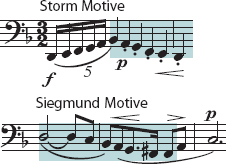
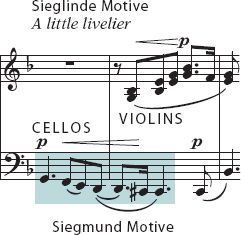
The first scene of Act I shows us the meeting of Siegmund and Sieglinde. He stumbles into her dwelling, worn to exhaustion by a pack of enemies pursuing him in a raging thunderstorm. (The storm is depicted by the orchestral prelude that opens the work.) Siegmund collapses on the hearth to the sound of a leitmotiv we quickly come to associate with him, a descending scale that is a transformed version of the theme of the storm. This musical connection shows us that the storm is in Siegmund’s soul as much as it is out in the elements.
Sieglinde enters from the back room and is startled to find a stranger unconscious on her floor. As she bends over him, concerned, the violins sound her leitmotiv — it rises up gently and falls back — while cellos underneath continue to play Siegmund’s. Wagner’s orchestral music has already joined the two characters.
What follows is one of the great portrayals of love at first sight in all of opera. Or nearly at first sight: Siegmund and Sieglinde’s attentions are riveted to each other almost from the moment he regains consciousness, but the intensity of their emotional connection grows quickly during this scene.
General Features Along the way the audience witnesses the primary features of Wagner’s revolutionary music drama.
- The orchestra, carrying the leitmotivs, plays a role far beyond merely accompanying the singers. It depicts for us the characters’ thoughts and especially their feelings, even during long stretches when they are not singing. It yields a sense of psychological depth and complexity in the characters — a sense conveyed, in typical Romantic fashion, more by music than by words.
- The leitmotivs hardly ever appear in exactly the same way twice but instead are transformed slightly for each new appearance. In this way their psychological portrayal shifts along with the drama. This probing, shifting depiction of the characters’ feelings is one of the hallmarks of Wagnerian drama.
- The singers, meanwhile, do not as a rule sing the leitmotivs, and their melodies show none of the tunefulness or lyrical song forms of Verdi’s Rigoletto. Instead they deliver a free-
formed declamation of the words, something like recitative, that blossoms forth now and then to approach tunefulness but never gives way to full- fledged aria.
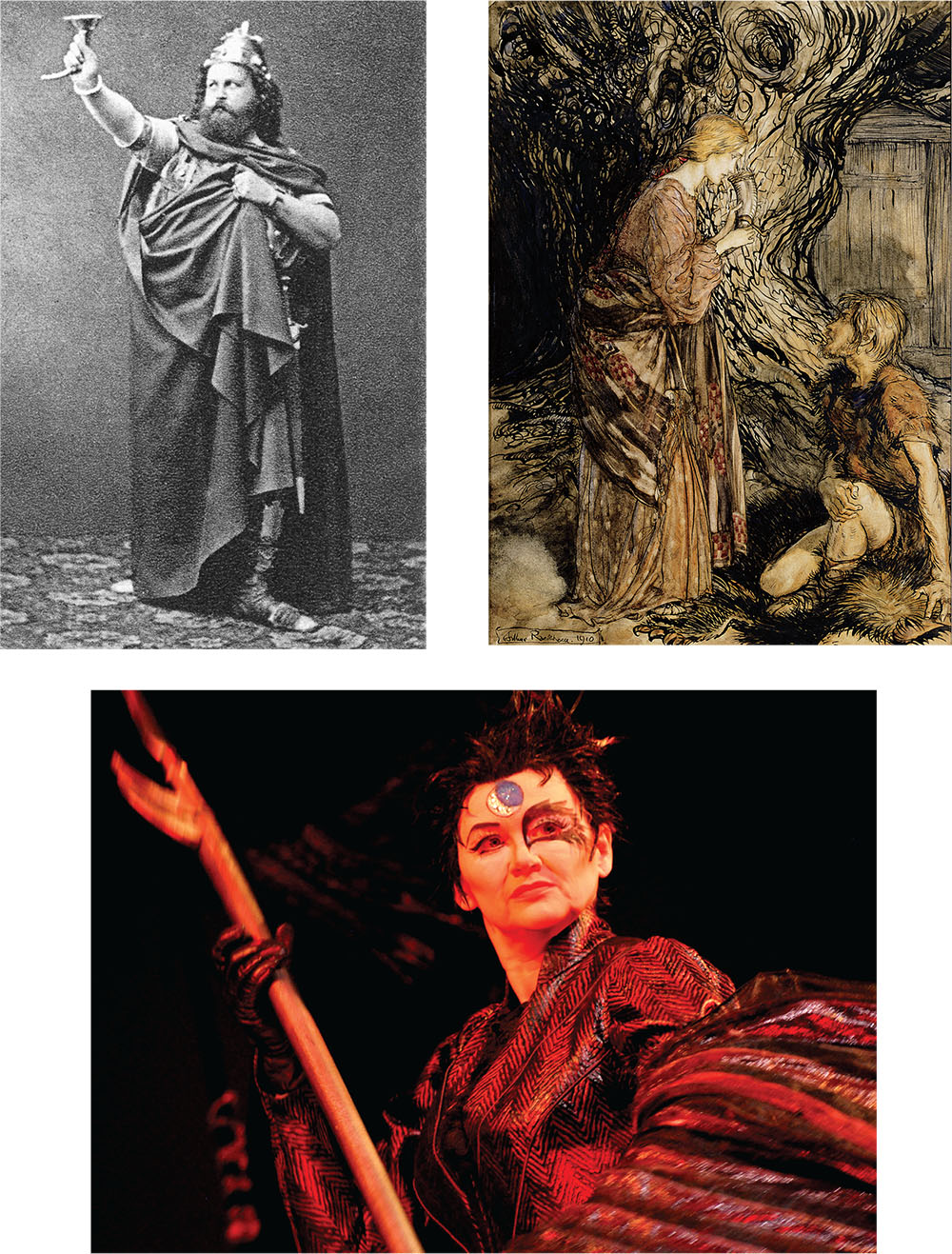
The First Drink As Sieglinde leans over him, Siegmund awakes and cries out for a drink. She hurries outside to fill a drinking horn for him. While she does so the orchestra takes over, building to a miniature climax before falling back; in its music we still hear Siegmund’s and Sieglinde’s leitmotivs. Siegmund drinks, and his eyes fix on Sieglinde for the first time. A new melody grows in the orchestra, warmly scored for solo cello and other low strings, and richly harmonized. It is the leitmotiv of their blossoming love:

Now the characters exchange information, for their benefit and the audience’s. Sieglinde tells him that she is Hunding’s wife; he tells her how he came to her home, and of the relief from his misery she has brought him: “Now the sun smiles on me anew.”
The Second Drink At this, Sieglinde spontaneously hurries to her storeroom to fill a horn with mead (a fermented honey drink) for him. This action, parallel to her fetching water earlier, summons from the orchestra an intensified version of its earlier climax. (See the Listen box, first and second orchestral climaxes.)
The lovers share the mead, their eyes now fixed on each other, and the love motive sounding in the orchestra also wells up — until Siegmund rouses himself with a deep sigh accompanied in the orchestra by a loud dissonant chord. He is ill-

Communion At Sieglinde’s last word a hesitant new, warm melody begins low in the orchestra; we immediately hear it as an affirmation of the deep empathy they already feel for each other. It is played first in sequence — a favorite of Wagner’s techniques for developing his leitmotivs. Then, when Siegmund announces he will stay, the orchestra cannot restrain itself; it pours forth a lush, Romantic harmonization of the new melody, the soon-
The passage comes to no cadence — another favorite trick of Wagner’s — but is cut off by a new, ominous leitmotiv in the low brasses. Hunding has returned, and the second scene begins.
Wagner’s drama often moves at a ponderous, slow pace, and it has sometimes been criticized for this. (And lampooned, too; there is a Bugs Bunny cartoon that takes on The Ring.) In the first scene of The Valkyrie we have the sense that searching looks and sighs are stretched out to exaggerated length. Other than Sieglinde’s fetching two drinks for Siegmund, there is little stage action. At the same time, however, especially because of his orchestra with its leitmotivs, Wagner manages to pack a lot into the minimal gestures of his characters. By the end of scene i, barely a quarter hour into the drama, we have been introduced to two protagonists and gained knowledge of their history and a subtle sense of their emotional lives. And, before our eyes and ears, their love has burgeoned.
LISTEN
Wagner, from The Valkyrie, Act I, scene i
| The inside of a dwelling, built around a huge ash tree in its midst; to the right a hearth, and behind it an inner storeroom. Siegmund, exhausted, enters from outside as the storm subsides. | ||||
| 0:00 | Siegmund: |
Wess’ Herd dies auch sei, hier muss ich rasten. |
Whoever’s hearth this may be, I must rest here. |

|
| He sinks back and lies motionless. Sieglinde enters, thinking her husband has returned; she is surprised to find instead a stranger. Hesitantly she approaches him closer and closer. | ||||
| Sieglinde: |
Ein fremder Mann? Ihn muss ich fragen. Wer kam ins Haus und liegt dort am Herd? Müde liegt er von Weges Müh’n: schwanden die Sinne ihm? |
A stranger here? I must ask him: Who has come into this house and lies on the hearth? He’s weary and travel- Is he unconscious? |
||
| 1:23 |
Wäre er siech? Noch schwillt ihm der Atem; das Auge nur schloss er. Mutig dünkt mich der Mann, sank er müd’ auch hin. |
Could he be sick? No, he is still breathing; he’s only sleeping. He seems to me valiant, even though he’s exhausted. |
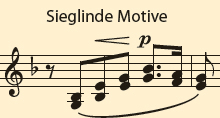
|
|
| Siegmund: | (suddenly raises his head) | |||
| Ein Quell! Ein Quell! | A drink! A drink! | |||
| Sieglinde: | Erquickung schaff’ ich. | I’ll bring some water. | ||
| 2:08 | FIRST ORCHESTRAL CLIMAX | |||
| She quickly takes a drinking horn and goes out. She returns with the horn filled and offers it to Siegmund. | ||||
|
Labung biet’ ich dem lechzende Gaumen: Wasser, wie du gewollt! |
Moisten your dry lips with this drink I’ve brought: water, as you wished! |
|||
| 2:59 | Siegmund drinks and gives the horn back. As he nods his head in thanks, his eyes fix on her face with growing interest. | |||
| 4:06 | Siegmund: |
Kühlende Labung gab mir der Quell, des Müden Last machte er leicht; erfrischt ist der Mut das Aug’ erfreut des Sehens selige Lust. Wer ist’s, der so mir es labt? |
The water brings me cooling relief; it lightens my weary load; my heart is refreshed, my eyes relish a beautiful, glorious sight. Who is it who so revives me? |
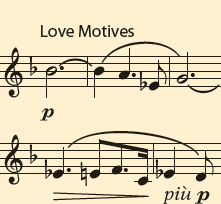
|
| 5:05 | Sieglinde: |
Dies Haus und dies Weib sind Hundings Eigen; gastlich gönn’ er dir Rast: harre, bis heim er kehrt! |
This house and this wife belong to Hunding; he’ll welcome you as guest; wait here until he returns! |
|
| Siegmund: |
Waffenlos bin ich: dem wunden Gast wird dein Gatte nicht wehren. |
I am weaponless; a wounded guest will not threaten your husband. |
||
| Sieglinde: | Die Wunden weise mir schnell! | You’re wounded? Where? | ||
| 5:33 | Siegmund: |
Gering sind sie, der Rede nicht wert; noch fügen des Leibes Glieder sich fest. Hätten halb so stark wie mein Arm Schild und Speer mir gehalten, nimmer floh ich dem Feind; doch zerschellten mir Speer und Schild. |
It’s nothing, pay no heed; my body is still strongly knit. If my shield and spear had been half as strong as my body, I never would have fled my foe. But spear and shield were shattered; |
|
| 5:51 |
Der Feinde Meute hetzte mich müd’, Gewitterbrunst brach meinen Leib; doch schneller, als ich der Meute, schwand die Müdigkeit mir; sank auf die Lider mir Nacht, die Sonne lacht mir nun neu. |
the horde of enemies chased me down, the thunderstorm broke body and spirit; but now — faster than I fled my weariness flees from me! Darkness sank on my eyes, but now the sun smiles on me anew! |

|
|
| 6:24 | SECOND ORCHESTRAL CLIMAX | |||
| Sieglinde goes to the storeroom and fills a horn with mead; she returns and offers it to Siegmund. | ||||
| Sieglinde: |
Des seimigen Metes süssen Trank mög’st du mir nicht verschmähn. |
Surely you’ll not refuse a sweet drink of honeyed mead. |
||
| Siegmund: | Schmecktest du mir ihn zu? | Would you not taste it first? | ||
| 7:21 | LOVE MOTIVES RETURN | |||
| Sieglinde drinks from the horn and gives it back. Siegmund takes a long drink, watching her all the while with growing warmth. At 8:33 (1:12) he sighs deeply and his eyes sink to the ground. | ||||
| Siegmund: |
Einen Unseligen labtest du: Unheil wende der Wunsch von dir! Gerastet hab’ ich und süss geruht: weiter wend ich den Schritt. |
You’ve helped an unhappy man; may I keep Ill- I have rested — rested sweetly; now I must go on my way. |
||
| Sieglinde: |
Wer verfolgt dich, dass du schon fliehst? |
Who follows you, making you flee? |
||
| 9:22 | Siegmund: |
Misswende folgt mir, wohin ich fliehe; Misswende naht mir, wo ich mich zeige. |
Ill- wherever I run; Ill- wherever I linger. |
|
| 9:54 |
Dir, Frau, doch bleibe sie fern! Fort wende ich Fuss und Blick. |
You, wife, keep your distance! I must turn my path from you. |
||
| He turns to leave. She calls after him impetuously. | ||||
| 10:10 | Sieglinde: |
So bleibe hier! Nicht bringst du Unheil dahin, wo Unheil im Hause wohnt! |
No, remain here! Ill- where Ill- |
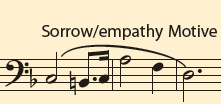
|
| He turns back, looks searchingly at her; she lowers her eyes in sadness and shame. | ||||
| Siegmund: |
Wehwalt hiess ich mich selbst: Hunding will ich erwarten. |
I myself named me Wehwalt — Woebound; I’ll wait for Hunding. |
||
| EMPATHY MOTIVE DEVELOPED | ||||
| He rests against the hearth, his eyes fixed on her; she raises her eyes to his, and they regard each other with deep emotion. At 12:26 (2:16) Sieglinde starts as she hears Hunding outside. |

|
|||